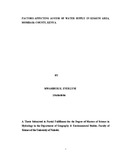Factors affecting access of water supply in Kisauni area, Mombasa county, Kenya
Abstract
The present study, factors affecting accessibility of water supply options was conducted
in Kisauni, Mombasa County with a main objective of finding the most accessible water
supply in terms of quality, quantity and cost among the existing water supply options and
also to access the role of solar powered desalination in improving accessibility of water
supply in Kisauni. With water scarcity problem growing worse as the world population
grows, water supplies need to be increased at household levels. Lack of clean drinking
water to households has already had a significant effect on international development. In
Mombasa 50% of the diseases reported are attributed to lack of access to clean water.
Solving water crisis in its many aspects is one of the greatest challenges facing mankind,
it is no wonder many are encouraged to look at the sea where the majority of world’s
water belong. Seawater desalination has been seen as a long-term freshwater source.
The study used questionnaires to get information on cost and quantity of water supply
available to the residents. The questionnaires were randomly distributed to residents
depending on their willingness to participate in the study. Water samples were collected
from the various water sources using sterilized plastic water samplers to determine its
quality through chemical and biological analysis. The study established that the available
water supply options in Kisauni are not accessible in terms of quality, quantity and cost
with tap water meeting WHO drinking water threshold but being highly costly and
unavailable while Groundwater is readily available at a very affordable cost, but the
quality is unfit for human consumption unless used with further treatment. Groundwater
quality is both chemically and biologically way above the WHO specified threshold, with
salinity and conductivity measuring up to 478.5 mg/l and 2180 μs/cm against the
specified 250mg/l and 2000 μs/cm respectively. General Coliform counts and E.coli were
2100MPN/100ml and 1200MPN/100ml respectively against the specified nil. The study
finds the use of small scale solar still to desalinate brackish groundwater as the most
accessible. With a base area of 0.72m2 producing an average of 1.97litres of desalinated
water and 150m2 expected to produce 410 litres per day other factors like weather
conditions being held constant. The study recommends that more research and awareness
should be conducted on solar desalination to help improve water supplies in the area

